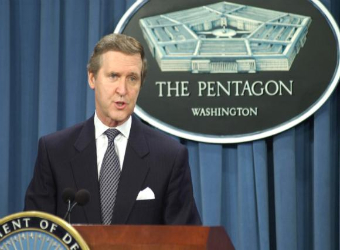President Barack Obama must contend with two losing scenarios in evaluating his options for any U.S. military strike against Syria for its use of chemical weapons, former Defense Secretary William S. Cohen said.
“I think we come out lose-lose,” Cohen, who led the Pentagon from 1997 to 2001 under then-President Bill Clinton, said in an interview on Bloomberg Television’s “Political Capital With Al Hunt” airing this weekend. “There’s no win-win proposition for us.”
The U.S. may be perceived as “feckless” if the Obama administration takes limited action against Syria after concluding that President Bashar al-Assad’s regime used chemical weapons against civilians, Cohen said, while tougher measures that could help oust Assad would create political uncertainty for the U.S.
“If we take action, it’s going to be limited in nature,” said Cohen, who led the Pentagon during U.S. military strikes against Kosovo in 1999. “It’s going to be seen as being too weak. If you take strong action, you’re going to be seen as toppling the regime and bringing in people that you’re not too sure will be on your side.”
Obama has said he is considering military options to respond to what the U.S. and allies say was the regime’s use of chemical weapons in a Damascus suburb as part of the fighting in a civil war that began more than two years ago.
“I have no interest in any kind of open-ended conflict in Syria, but we do have to make sure that when countries break international norms on weapons like chemical weapons that could threaten us, that they are held accountable,” Obama said in an Aug. 28 interview with PBS’s “NewsHour.”
Obama’s Challenge
Obama must present compelling reasons to the U.S. public and engage in greater consultation with Congress before taking any action, Cohen said.
“The real issue is, can the president of the United States persuade the American people that this is such a heinous act and persuade the international community they must stand behind this?” he said.
Officials including Secretary of State John Kerry and Defense Secretary Chuck Hagel last night conducted a conference call with congressional leaders of both parties “to brief them on the administration’s thinking and seek their input on the U.S. response to the Assad regime’s use of chemical weapons near Damascus” on Aug. 21, according to a White House statement.
Syria’s conflict is increasingly dividing the Middle East, which produces about a third of the world’s oil, along sectarian lines and has pitted the U.S. and France against China and Russia in the United Nations Security Council. The British House of Commons last night rejected U.K. Prime Minister David Cameron’s request for parliamentary approval for military action against Syria.
Russia’s Stance
Russia, a staunch Assad ally, said yesterday that the UN probe of chemical-weapon use should be widened to include other reports of such incidents in Syria. Russia has signaled it will veto a Security Council resolution authorizing use of force aimed at Assad’s government.
The U.S. should seek to isolate Russia by pushing for a UN Security Council vote authorizing a strike, Cohen said.
With Russia likely veto it, “the president would be free to then take action consistent with a humanitarian type of mission and say, we tried,” Cohen said. “We put the Russians on record.”
Congressional Consultation
Obama should summon congressional leaders back to Washington for more talks with them on any military decision, even though he doesn’t have to under the War Powers Act, Cohen said.
“I’d get the leadership back right away, saying this may be Labor Day weekend, but we want you back here in Washington,” he said. “I would persuade them, if I had the evidence, that this is what’s taken place and this is why action must be taken.”
If a military strike doesn’t change the “dynamic on the ground” and press Assad to negotiate a settlement with rebel forces in his nation’s civil war, Cohen said, “then you’re just asking people to continue to fight with no hope of ever achieving their particular goal and more bloodshed.”


